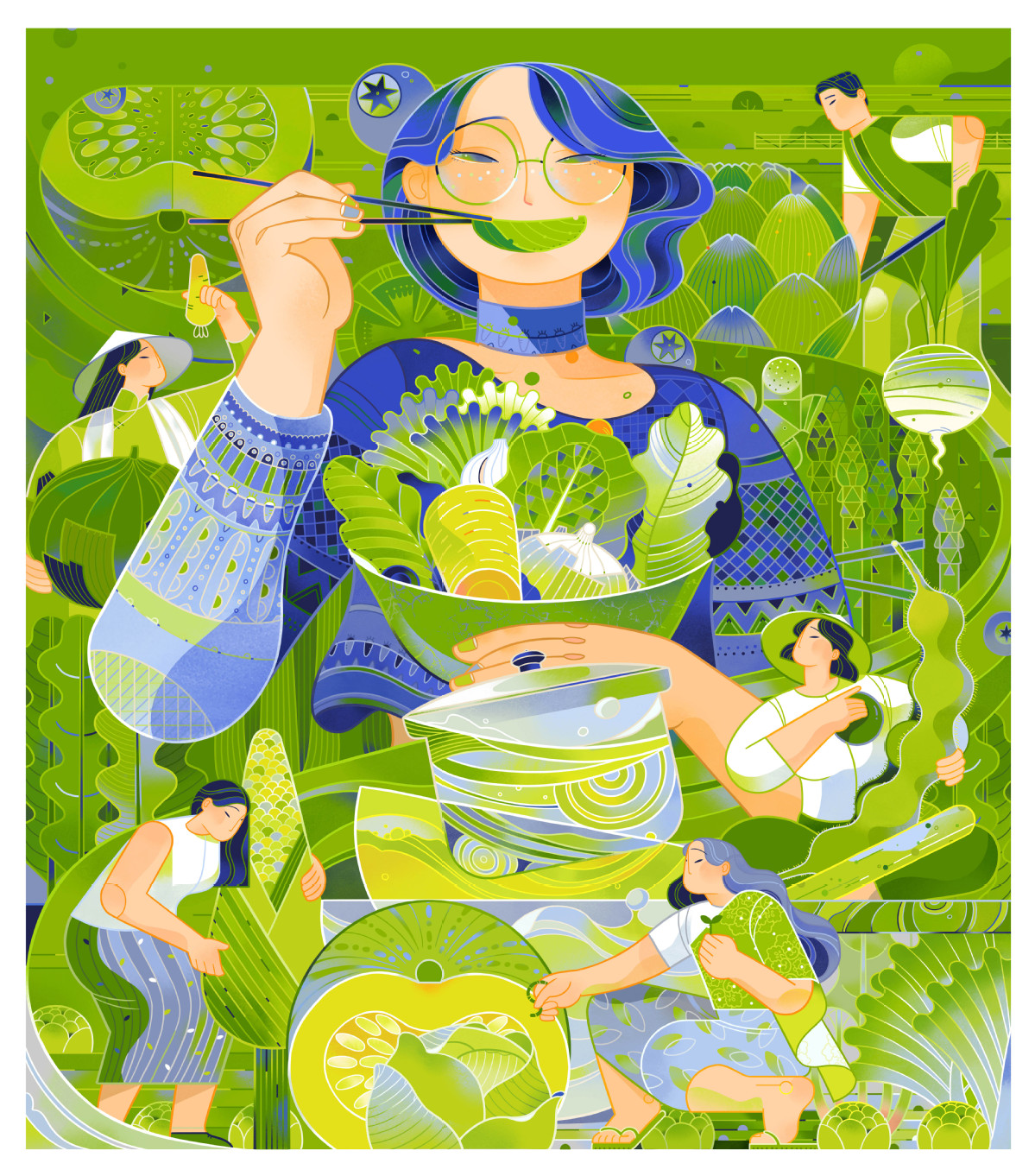Lockdowns whet appetite for organic food


Southeast Asians turn to sustainable farms, urban gardens
For the past five years, farmer Michael Christian Simon has regularly supplied organic vegetables to a steady clientele of more than 30 families in the Malaysian state of Selangor.
"I started farming for my family, but I soon discovered that it's a viable and sustainable business," he said.
While Simon is happy that his passion has become a money-spinner, he did not expect the coronavirus pandemic to result in a windfall.
Soon after the Malaysian government imposed a movement control order, or MCO, in mid-March, the orders he received for produce rose to more than 100 as consumers forced to stay home bought food online.
Simon had to refuse most of these orders, as his farm can only produce 150 kilograms of vegetables a week. While the government has gradually eased lockdown measures in recent weeks, he believes that consumers will continue to buy directly from farmers, especially those who raise organic crops.
"In the past, Malaysians could buy vegetables everywhere, but because of the MCO, they started buying online. That's when they reached out to farmers and became more conscious of what and where they were buying," Simon said.
Online shopping is now the norm in Southeast Asia, as governments throughout the region have enforced lockdown and social distancing measures to check the spread of the virus.
However, these measures have temporarily disrupted the supply of food from farms to cities and towns, with public transportation services suspended and trading outlets shuttered.
This situation has prompted urban residents to seek alternative ways to buy food.
One of the most popular options is to buy directly from farmers through e-commerce sites and social media networks. Meanwhile, others residents have started to grow vegetables at home.
Mary Ann Sayoc, public affairs lead for the East-West Seed Group, or EWS, said urban gardening has been a big hit in the Philippines during community quarantine.
EWS supplies seeds to wholesalers and distributors, but outlets had to close in March when the Philippine government introduced lockdown measures. Sayoc said her company then went online and started selling seeds directly to consumers.
As of mid-September, it had sold more than 30,000 seed pouches, and Sayoc said EWS would not quit the retail market anytime soon.
"Home gardening is not just a fad-it's part of the new normal. The pandemic has heightened public awareness of the importance of growing safe and nutritious vegetables for home consumption," she said.
Wong Jin Quan, program manager at management consultancy Padang & Co, which is based in Singapore, expects governments in Southeast Asia to promote urban gardening even after the pandemic.
"Urban gardening will continue to grow as governments recognize it as a potential alternative to diversify food sources," Wong said.
He added that as city population densities rise, food security will become a pressing issue.
"If anything, the pandemic has merely accentuated fault lines within global food supply chains and accelerated industry and governmental support for commercial urban gardens," Wong said.
Starter kits
In the Philippines, the Department of Agriculture has allocated 400 million pesos ($8.26 million) to promote urban gardening. Agriculture Secretary William Dar said, "This is part of our household food security arsenal."
The department is distributing starter kits to households and local governments to encourage them to grow vegetables.
Each kit contains a packet of assorted vegetable seeds, an instruction brochure and sample designs for pocket, container and community gardens.
Meanwhile, the Singapore Food Agency is leasing out the rooftops of public buildings for vegetables and other food crops to be grown. This program is in line with the city-state's "30 by 30" goal, which aims to produce 30 percent of its food locally by 2030.
Food and agriculture industry experts said the rise of urban gardening and buying directly from organic farmers are part of the farm-to-table social movement, which has gained traction in the region in recent years.
The movement became popular in the early 2000s, when advocates of sustainable agriculture promoted seasonal produce sourced directly from farms. This provides small farmers with more income, as they do not have to rely on middlemen for sales. Consumers are also assured of quality and safety, as they can trace the source of their food.
Advocates of the farm-to-table movement also promote the welfare of small farmers, the importance of an ecologically sound farming system, and the cultivation of heirloom crops-fruit, flower or vegetable varieties commonly grown before World War II, but which are not used in large-scale modern agriculture.
In Southeast Asia, the rapid rise of the regional economy has failed to boost the agriculture sector. From 2000 to 2015, the region recorded annual GDP growth of more than 5 percent.
However, during this period, the agriculture sector grew by only 3 percent, according to the International Food Policy Research Institute.
This has affected the livelihoods of some 100 million small farmers in the region, inspiring growth of the farm-to-table movement, according to the policy think tank Heinrich Boll Stiftung, which is based in Berlin.
"Decreasing rice prices and extreme climate-related events such as typhoons, floods or droughts shifted rural households into widespread poverty, and organic farming was introduced as one means of relief. It can offer an alternative livelihood strategy for farmers in rural or urban areas and provide mitigation for climate change-related impact," the think tank said.
Asked about their commitment to the farm-to-table movement, restaurateurs stressed the welfare of small farmers and the environment.
Malaysian chef Darren Teoh, who owns the fine-dining restaurant Dewakan in Kuala Lumpur, the country's capital, said the principles of the movement are aimed at promoting sustainable agriculture.
Teoh is an advocate of such agriculture, which involves not only buying organically grown produce, but offering fair prices to farmers and championing indigenous crops.
Dewakan is known for its dishes made from indigenous and long-forgotten ingredients in Malaysia, including buah kulim, a fruit only found in the country's rainforests, and bunga kantan, the torch ginger flower.
"We form connections with people who have similar values and principles, and see if this translates to the work they do in the field," Teoh said, adding that about 90 percent of the ingredients used at Dewakan are bought directly from Malaysian farmers and indigenous groups.
Helga Angelina Tjahjadi, co-founder of Burgreens, a vegetarian restaurant and caterer in Jakarta, the Indonesian capital, aims to serve food that is good for diners, the soil and farmers.
"When we talk about sustainability, there are three qualities that our company values. First, it has to be plant-based, because plants use fewer resources and have fewer greenhouse gas emissions. Second, we use mostly local ingredients. Third, we also make sure that farmers are getting a fair income," she said.
Wong, of Padang & Co, said the expanding middle class in Southeast Asia is keen on issues such as food safety and environmental protection.
As people become more affluent, they are increasingly concerned about their food consumption from a number of perspectives, such as health, the environment and social impact, he said.
"In Southeast Asia, many people are aware of the vulnerabilities of small farmers and are generally empathetic toward them."
Wong said the affordability of smartphones and the increased access to mobile technology have encouraged farmers in their marketing efforts.
He also said technology startups in the region play a key role in making direct-from-farm purchases easier-from sourcing produce and packing it in warehouses, to cross-regional transportation and delivery to urban consumers.
New generation
With lockdowns prompting more customers to go online and buy directly from farmers, a new generation of tech-savvy agriculturists is turning to social media and e-commerce sites to promote and sell produce.
For example, in Thailand, fruit farmers who traditionally sell their produce to wholesalers have started to market it directly to consumers by using Facebook and the messaging app LINE, according to a report by Thai Enquirer, an online news site.
In Malaysia and Indonesia, farmers and fishermen are using e-commerce sites to sell their produce, as lockdowns have affected their sales, according to a BBC report.
Wong said direct-from-farm purchases were more the result of a logistical problem, rather than consumer desire to buy straight from farms. While these logistical bottlenecks have now been resolved, he believes consumers will continue to use online marketplaces to buy from farmers.
"I think the new normal for food purchases will follow the trend of new retail. People will prefer to buy things the way they want and where they want. This means that while traditional food supply chains won't be disrupted completely, the direct farm-to-consumer model is here to stay and will take a significant market share," he said.
Wong hopes more farmers will embrace digitalization as a "strong pathway to better rural livelihoods", but he said this will require support from elsewhere, including governments, agribusiness companies and research institutions.
"Multi-stakeholder interventions can effectively engage and educate farmers, and also develop infrastructure and sustainable business models to create lasting change," he said.
Teoh, from Dewakan, said consumers' lifestyles will determine if the direct farm-to-consumer model remains relevant after the pandemic.
He is unsure if consumers who have bought produce online during lockdowns will continue to do so when they return to work, as they spend a lot of time commuting. However, he believes that lockdowns give more people the chance to learn about sustainable agriculture.
Tjahjadi, from Burgreens, said the pandemic could lead to a gradual behavioral change among Indonesians, adding that even before the outbreak, a growing number of people had started to care about where their food comes from.
"There's a healthy food trend in Indonesia," she said, adding that this has been heightened during lockdown.
Tjahjadi said some residents in Jakarta have started urban gardens, as they are spending more time at home. She expects people to continue cultivating their gardens after the pandemic, as this lifestyle has emerged during months of lockdown.




































